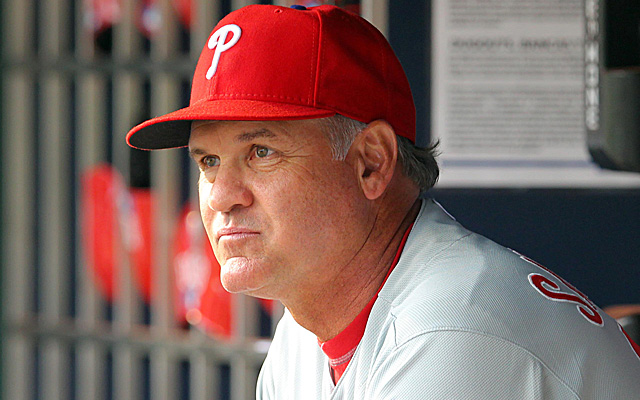The only true wisdom is in knowing you know nothing - Socrates
In light of the announcement Friday afternoon that Ryne Sandberg was stepping down from his post as Phillies manager, I couldn't help but think about how true this quote rings. I'm gonna back off and say that when it comes to judging Ryne Sandberg as a manager, I know nothing.
Sandberg took over on the back-end of the Phillies as NL East juggernaut. This was a team that won five NL East titles in a row, during which time they won two pennants and the first World Series championship for the franchise since 1980.
Chase Utley was 34. So were Jimmy Rollins, Cliff Lee and Carlos Ruiz. Ryan Howard was 33 and still recovering from his Achilles issue. Roy Halladay was done at 36. As for any youth movement, the Phillies had one of the worst farm systems in the majors and general manager Ruben Amaro was instead trying to plug holes by grabbing old veterans like Michael Young or by overpaying for Jonathan Papelbon (to be specific: Signing closers to huge deals like that is rarely a good idea, but Papelbon has been productive for the Phillies. The point is that it was probably money better spent elsewhere, as a highly-paid closer during a rebuild is silly).
Since that 2013 season, the Phillies have been slowly realizing the franchise badly needs to transition away from the past and toward the future. Far too slowly, of course, but that's neither here nor there for the purposes of this discussion.
In the middle of this transition was Sandberg.

The rare Hall of Famer to choose to pay his dues, he went back to the minors and rode buses as manager of the Class A Peoria Chiefs (Cubs system) in 2007. He worked his way up to Triple-A in the Cubs' system, believing he was next in line to take over when Lou Piniella was done. Instead, then-Cubs GM Jim Hendry tabbed Mike Quade as the replacment and Sandberg went to the Phillies' organization, taking over the Lehigh Valley IronPigs.
Sandberg had great success as a minor-league skipper, racking up playoff appearances and individual accolades in the process.
In the majors, though, which is a whole different ballgame, Sandberg ends his Phillies' tenure with a mark of 119-159.
That's with sub-par talent, as noted above. For example, here is the most common Phillies' lineup this season:
1. Ben Revere
2. Odubel Herrera
3. Chase Utley
4. Jeff Francoeur
5. Ryan Howard
6. Cody Asche
7. Carlos Ruiz
8. Freddy Galvis
Yikes. Keep in mind, Utley is hitting .179 this season.
Behind Cole Hamels, the rotation has been a mix consisting of Aaron Harang, Jerome Williams, Sean O'Sullivan, David Buchanan, Severino Gonzalez, Chad Billingsley and Kevin Correia.
You really wanna judge a manager on wins and losses when dealing with that roster? It's brutal. We definitely can't blame this situation on him.
On the flip-side, it's hard to say Sandberg did a good job in managing his players. From time to time, managers are dealt a bad hand and still find ways to get the most out of their players. Not only that, but I'm left wondering why Sandberg had to pay his dues so thoroughly in the minors with his Hall of Fame player resume when someone like Paul Molitor can step right into the Twins and immediately have good success (to this point). That Twins roster is more talented than the Phillies, but they aren't exactly the Dodgers or Nationals.
We have seen others who weren't as successful as players such as Brad Ausmus and Mike Matheny be hired right to the big-league level without minor-league managing experience.
So what was it about Sandberg that made teams so reluctant to hire him as the top dog in terms of on-field management? Is that at least part of why these Phillies didn't make strides forward, even with a terrible roster?
It's real hard to tell. In fact, we can't tell. Anyone who says otherwise is fooling himself or herself.
You think you know if Ryne Sandberg is actually a good manager? You know better than I do. I sense that Socrates would agree.

















